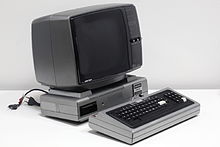
Back تي آر إس 80 Arabic تى آر اس-80 موديل 1 ARZ TRS-80 Danish Tandy TRS-80 Model 1 German TRS-80 Esperanto TRS-80 Finnish TRS-80 Galician TRS-80 HE TRS-80 Japanese TRS-80 Korean
 TRS-80 Model I with Expansion Interface and display | |
| Manufacturer | Tandy Corporation |
|---|---|
| Type | Home computer |
| Release date | August 3, 1977[1] |
| Lifespan | 1977–1981, 4 years |
| Introductory price | US$599.95 (equivalent to $3,020 in 2023) |
| Discontinued | January 1981 |
| Units sold | |
| Operating system | TRSDOS, LDOS, NewDos/80, Level I BASIC |
| CPU | Zilog Z80 @ 1.774 MHz |
| Memory | 4–48 KB |
| Display | Monochrome 12" CRT, 64 × 16 character semigraphics |
| Sound | Square wave tones |
The TRS-80 Micro Computer System (TRS-80, later renamed the Model I to distinguish it from successors) is a desktop microcomputer developed by American company Tandy Corporation and was sold through their Radio Shack stores. Launched in 1977, it is one of the earliest mass-produced and mass-marketed retail home computers.[4] The name is an abbreviation of Tandy Radio Shack, Z80 [microprocessor], referring to its Zilog Z80 8-bit microprocessor.[5]
The TRS-80 has a full-stroke QWERTY keyboard, 4 KB dynamic random-access memory (DRAM) standard memory, small size and desk area, floating-point Level I BASIC language interpreter in read-only memory (ROM), 64-character-per-line video monitor, and had a starting price of US$600[1] (equivalent to US$3,000 in 2024). A cassette tape drive for program storage was included in the original package. While the software environment was stable, the cassette load/save process combined with keyboard bounce issues and a troublesome Expansion Interface contributed to the Model I's reputation as not well-suited for serious use. Initially (until 1981), it lacked support for lowercase characters which may have hampered business adoption. An extensive line of upgrades and add-on hardware peripherals for the TRS-80 was developed and marketed by Tandy/Radio Shack. The basic system can be expanded with up to 48 KB of RAM (in 16 KB increments), and up to four floppy disk drives and/or hard disk drives. Tandy/Radio Shack provided full-service support including upgrade, repair, and training services in their thousands of stores worldwide.
By 1979, the TRS-80 had the largest selection of software in the microcomputer market.[6] Until 1982, the TRS-80 was the bestselling PC line, outselling the Apple II by a factor of five according to one analysis.[5] The broadly compatible TRS-80 Model III was released in the middle of 1980. The Model I was discontinued shortly thereafter, primarily due to stricter Federal Communications Commission (FCC) regulations on radio-frequency interference to nearby electronic devices.[7][8] In April 1983, the Model III was succeeded by the compatible TRS-80 Model 4. Following the original Model I and its compatible descendants, the TRS-80 name became a generic brand used on other unrelated computer lines sold by Tandy, including the TRS-80 Model II, TRS-80 Model 2000, TRS-80 Model 100, TRS-80 Color Computer, and TRS-80 Pocket Computer.
- ^ a b Forster, Winnie (2005). The Encyclopedia of Consoles, Handhelds & Home Computers 1972–2005. Gameplan. p. 17. ISBN 3-00-015359-4.
- ^ "Advertisement: Radio Shack". Computerworld. Vol. XIII, no. 42. October 15, 1979. p. 31. ISSN 0010-4841.
How we sold over 100,000 TRS-80 Model I Systems
- ^ "Table 2: United States (1978-1982)". Computers and People. 33–36. Berkeley Enterprises: 19. 1984.
TRS-80 (all models) 2,400,000
- ^ Mooallem, Jon (April 19, 2010). "The Lost Tribes of RadioShack: Tinkerers Search for New Spiritual Home". Wired. Retrieved August 3, 2012.
- ^ a b McCracken, Harry (August 3, 2012). "Please Don't Call It Trash-80: A 35th Anniversary Salute to Radio Shack's TRS-80". Time.
- ^ Welch, David and Theresa (2007). Priming the Pump: How TRS-80 Enthusiasts Helped Spark the PC Revolution. Ferndale, Michigan: The Seeker Books. ISBN 978-0-9793468-0-4.
- ^ "Radio Shack TRS-80 Micro Computer System". oldcomputer.org. Retrieved May 6, 2010.